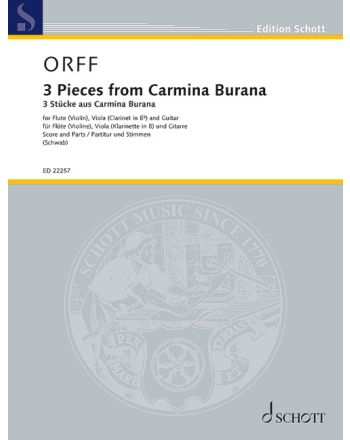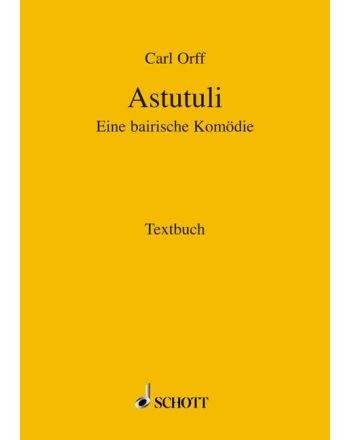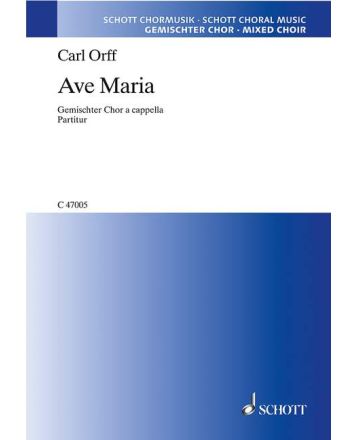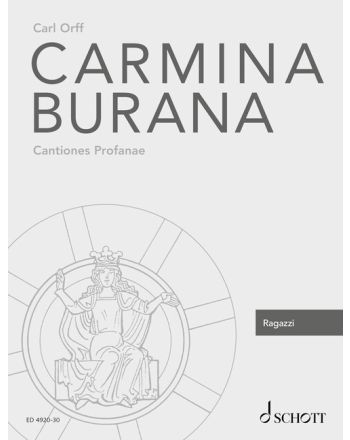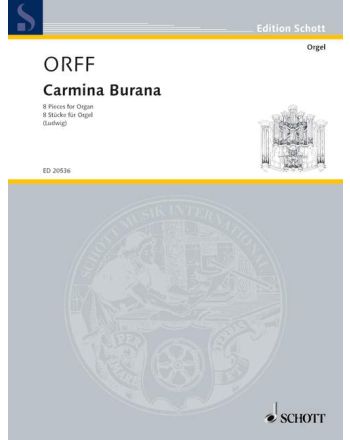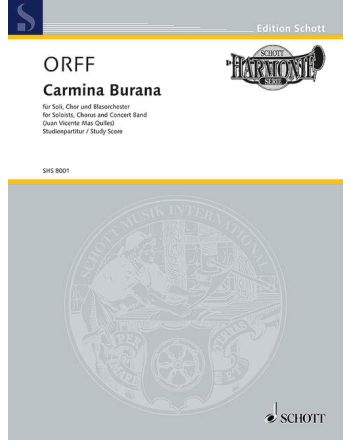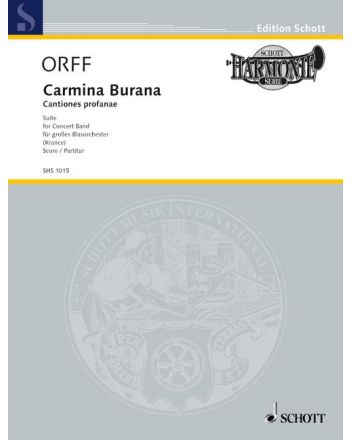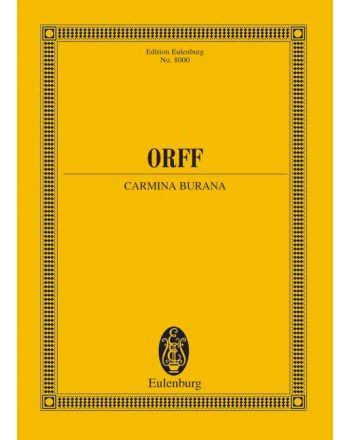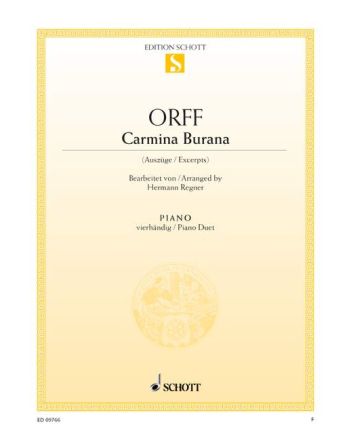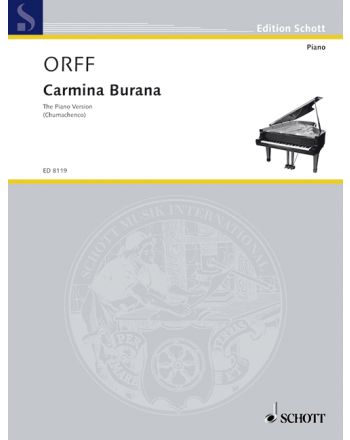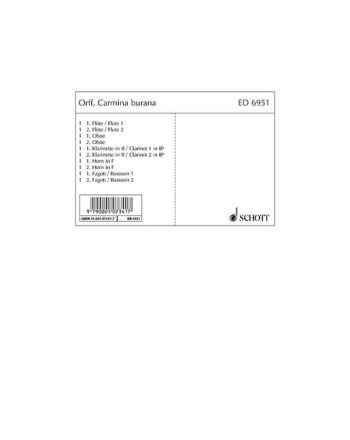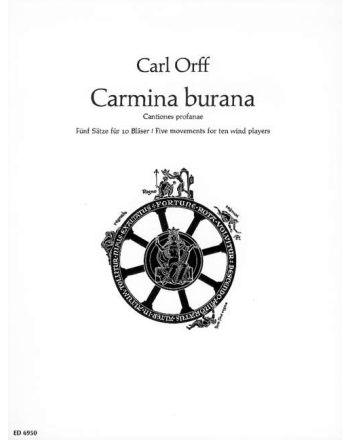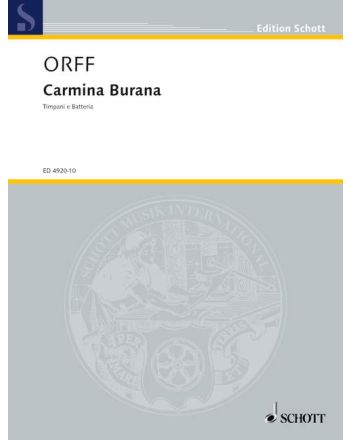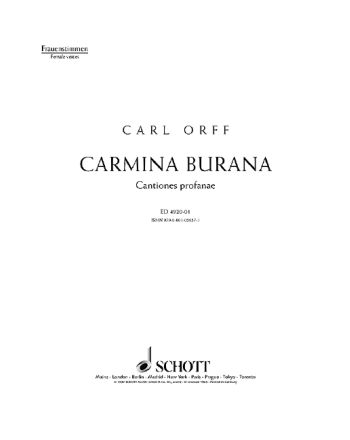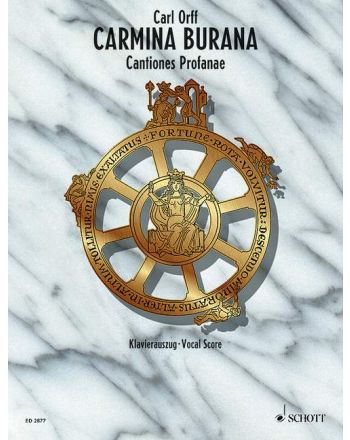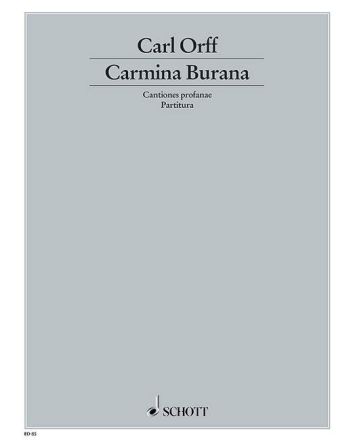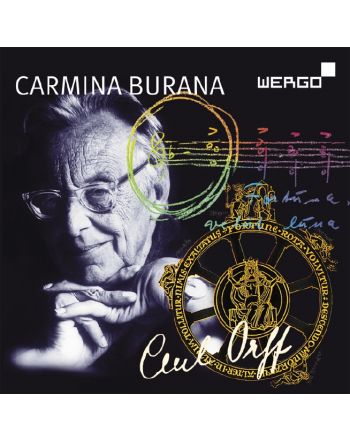
Carl Orff
Upcoming Performances
About Carl Orff
Orff’s music, his musikē – I deliberately utilise the Greek expression – offers less for the ear than traditional opera music. In exchange, it involves all the senses; it is not just sound, but also dance; not just tone but also playing; not only singing but also scenes and theatre – it is music in the sense of an artistic muse uniting and fusing all the arts , as originally conceived by the Ancient Greeks. (Hans Maier)
Carl Orff was born on 10 July 1895 in Munich. He received his first piano tuition at the early age of five, and subsequently also cello and organ lessons. Evidence shows that he regularly attended the theatre and opera from 1903 onwards. In 1911, his first work was published: the lied “Eiland, ein Sang vom Chiemsee”, although Orff up to this point had not yet begun systematic courses in music theory. From 1912 to 1914, he studied composition with Anton Beer-Walbrunn at the Munich Akademie der Tonkunst and from 1915 piano with Hermann Zilcher. In 1915, Orff was able to gather initial practical experience in the theatre, worked as repetiteur and one year later was appointed as kapellmeister of the Munich Chamber Theatre. Following a brief period of military service, he was appointed as kapellmeister assisting Wilhelm Furtwängler at the National Theatre in Mannheim and the Landestheater Darmstadt. He received further training in composition from Heinrich Kaminski and undertook an extensive study of Bach, Buxtehude, Pachelbel and particularly Monteverdi. A co-founder of the “Günther School” for gymnastics, music and dance in Munich (1924), Orff became the director of the department for dance and musical education. This was for Orff an ideal experimental educational field for the development of the “Orff Schulwerk” (1930-1934/1950-1954) which was distributed with great success worldwide and continues today to be utilised within the areas of social and therapeutic education. In 1936, Orff received the commission to compose a part of the processional music for the opening ceremony of the Olympic Games. From 1950 to 1960, he held master classes for composition at the Staatliche Hochschule für Musik in Munich. From 1955, he was resident in Dießen on Lake Ammer and died on 29 March 1982 in Munich.
Right from the beginning, Orff concentrated exclusively on textually related music. His aim was to combine theatre, music, dance and acting to form a single unified whole in which the rhythmical organisation of language frequently provided the compositional framework. Orff composed his first choral work (“Also sprach Zarathustra”, based on Nietzsche) and an early opera strongly influenced by Debussy entitled Gisei, das Opfer, which was completed in 1913. Orff found his way to his own individual style through the study of the counterpoint of the old masters. His fascination for mediaeval and classical texts was reflected in works such as his cycle Trionfi (Carmina Burana, 1936, Catulli Carmina, 1943 and Trionfo di Afrodite, 1951), Hölderlin’s adaptations of Greek dramas Antigonae (1949) and Oedipus der Tyrann (1959) and Aischylos’ Prometheus (1967). The works in the style of fairy tales such as Der Mond (1938/71) and Die Kluge (1942) belong to a further group of works. Orff was fascinated by the vocal richness of dialects and also wrote works utilising Old Bavarian: Die Bernauerin (1946). His final stage composition, the mystery play De temporum fine comoedia, was premiered at the Salzburg Festival in 1973.
Carmina Burana is Orff’s most famous composition. The staged cantata consisting of a collection of songs was based on texts from a mediaeval manuscript housed in the monastery Benediktbeuern. Orff created incredibly dynamic music combining archaic harmony and pulsating dance-like rhythms. The powerful chorus “Fortuna” which frames the vernal, drinking and love songs has made Carmina Burana one of the most frequently performed works of the 20th century.
Carl Orff received honorary doctorates from the Universities of Tübingen (1959) and Munich (1972) and also the Great Order of Merit with Star and shoulder ribbon of the Federal Republic pf Germany (1972). In 1947, he was awarded the Music Prize of the City of Munich and in 1974 the Romano Guardini Prize by the Catholic Academy of Bavaria. Carl Orff was made honorary citizen of the City of Munich and became a member of the Order pour le Mérite for science and the arts. The Carl Orff Museum in Dießen on Lake Ammer, commemorates the life and work of the composer; numerous educational establishments, schools and institutions have been named after him.
Worklist
Gallery


Chronology
Products
-
Uf dem anger - In trutina - Were diu werlt alle minComposer: Carl OrffArranger: Siegfried SchwabEdition: Score and partsSeries: Edition Schott
Instrumentation: flute (violin), viola (clarinet) and guitarProduct number: ED 22257Product TypeIn stockAs low as €18.99Incl. Tax -
Composer: Carl OrffArranger: Hermann RegnerMedia Type: Sheet musicEdition: Set of partsSeries: Schott Harmony Series
Instrumentation: wind bandProduct number: SHS 3004-70Print editionPrint editionIn stock€45.00Incl. Tax, Excl. Shipping -
Composer: Carl OrffArranger: Hermann RegnerMedia Type: Sheet musicEdition: ScoreSeries: Schott Harmony Series
Instrumentation: wind bandProduct number: SHS 3004Print editionPrint editionIn stock€15.50Incl. Tax, Excl. Shipping -
A tragedy by Sophocles translated by Friedrich Hölderlin / season 2006/07Composer: Carl OrffText writer: SophoklesInterpreter: Mark Adler | Andreas Daum | Markus Durst | Sven Ehrke | Katrin Gerstenberger | Thomas Mehnert | Susanne Serfling | supernumerary actors of the State Theatre Darmstadt | Jeffrey Treganza | Anja VinckenConductor: Stefan BlunierStage director: John DewOrchestra/ensemble: Darmstadt State OrchestraMedia Type: DVDProduct number: MV 8555DVDDVDOut of stock€26.90Incl. Tax, Excl. Shipping
-
Ein Trauerspiel des Sophokles in der deutschen Übersetzung von Friedrich HölderlinComposer: Carl OrffMedia Type: Hire/performance materialEdition: Performance materialLanguage: GermanHire/performance materialHire/performance material
-
Vol. 1 | PentatonigComposer: Gunild Keetman | Carl OrffEditor: Elinor Olwen JonesEdition: Vocal and performing scoreSeries: Orff-Schulwerk, Vol. 1
Instrumentation: voice, recorder and percussionProduct number: ED 10974Product TypeIn stockAs low as €8.99Incl. Tax -
Die KlugeComposer: Carl OrffEditor: Claudia EderMedia Type: E-score PDFInstrumentation: tenor and pianoLanguage: GermanProduct number: ED 21141 Q20381E-score PDFE-score PDFIn stock€2.99Incl. Tax
-
Die KlugeComposer: Carl OrffEditor: Claudia EderMedia Type: E-score PDFInstrumentation: tenor and PianoLanguage: GermanProduct number: ED 21141 Q20380E-score PDFE-score PDFIn stock€2.99Incl. Tax
-
Eine bairische KomödieProduct TypeIn stockAs low as €5.99Incl. Tax
-
A Bavarian ComedyComposer: Carl OrffLibrettist: Carl OrffInterpreter: Christoph Gehr | Winfried Huebner | Michael Schanze | Michael SchlengerStage director: Peider A. DefillaOrchestra/ensemble: Young Munich Philharmonic OrchestraConductor: Mark MastChoir: World Theatre Choirs AndechsMedia Type: DVDProduct number: MV 8525DVDDVDIn stock€26.90Incl. Tax, Excl. Shipping
-
Eine bairische KomödieComposer: Carl OrffMedia Type: Hire/performance materialEdition: Performance materialLanguage: GermanHire/performance materialHire/performance material
-
Composer: Carl OrffEdition: Choral scoreSeries: Schott Choral Music
Instrumentation: mixed choir (SATB)Product number: C 47005Product TypeIn stockAs low as €2.99Incl. Tax -
Composer: Carl OrffEditor: Klaus Heizmann | Wilhelm LuettichMedia Type: E-score PDFLanguage: French, German, Latin, EnglishProduct number: ED 20769 Q14297E-score PDFE-score PDFIn stock€0.99Incl. Tax
-
MCMCIn stock€12.00Incl. Tax, Excl. Shipping
-
10 alte MelodienComposer: Carl OrffMedia Type: Sheet musicEdition: Vocal and performing scoreSeries: Orff-Schulwerk
Instrumentation: mixed choir/women's choir/men's choir a cappella or with instruments ad libitumProduct number: ED 4454Print editionPrint editionIn stock€8.50Incl. Tax, Excl. Shipping -
ErinnerungenBookBookIn stock€54.50Incl. Tax, Excl. Shipping
-
A Guide to the Stage WorksComposer: Carl OrffMedia Type: Promotional materialLanguage: German, EnglishProduct number: KAT 3245-99Promotional materialPromotional materialIn stock€0.00Incl. Tax, Excl. Shipping
-
List of Published WorksPromotional materialPromotional materialIn stock€0.00Incl. Tax, Excl. Shipping
-
Ludi scaeniciComposer: Carl OrffIllustration: Alexander ZakharovInterpreter: Thomas Dewald | Lisa Griffith | Alois Ickstadt | Elisabeth Kraemer | Karl Rarichs | Fritz Walther-LindqvistChoir: Frankfurter KantoreiOrchestra/ensemble: Royal Flemish Philharmonic of AntwerpenConductor: Wolfgang SchaeferMedia Type: CDProduct number: INT 31692CDCDIn stock€14.99Incl. Tax, Excl. Shipping
-
Ein BriefwechselAuthor: Ferdinand Leitner | Carl OrffEditor: Lukas Naef | Matthias von OrelliMedia Type: BookSeries: Publikationen des Orff-Zentrums München, Vol. I/1
Language: GermanProduct number: ED 20113BookBookIn stock€43.00Incl. Tax, Excl. Shipping -
Ein BriefwechselAuthor: Carl Orff | Guenther RennertEditor: Andreas BackoeferMedia Type: BookSeries: Publikationen des Orff-Zentrums München, Vol. I/2
Language: GermanProduct number: ED 23100BookBookIn stock€43.00Incl. Tax, Excl. Shipping -
Composer: Carl OrffMedia Type: CD-ROMSeries: musicAvision
Language: German, EnglishProduct number: MV 8010CD-ROMCD-ROMIn stock€5.00Incl. Tax, Excl. Shipping -
Cantiones profanaeComposer: Carl OrffEdition: Individual part, Children’s choir / RagazziSeries: Carmina Burana
Instrumentation: soloists (STBar), mixed choir (SATB), children's choir and orchestra (or 2 pianos and percussion or großEb wind band)Product number: ED 4920-30Product TypeIn stockAs low as €3.99Incl. Tax -
8 Pieces for organComposer: Carl OrffArranger: Klaus Uwe LudwigSeries: Edition Schott
Instrumentation: organProduct number: ED 20536Product TypeIn stockAs low as €13.99Incl. Tax -
Cantiones ProfanaeComposer: Carl OrffEdition: Choral scoreSeries: Carmina Burana
Instrumentation: soloists (STBar), mixed choir (SATB), children's choir and orchestraProduct number: ED 4920-20Product TypeIn stockAs low as €19.99Incl. Tax -
Cantionae profanaeComposer: Carl OrffArranger: Juan Vicente Mas QuilesEdition: Study scoreInstrumentation: soloists (STBar), mixed choir (SATB), children's choir and großEb wind bandProduct number: SHS 8001Product TypeIn stockAs low as €79.99Incl. Tax
-
Cantiones profanaeComposer: Carl OrffArranger: John KranceEdition: ScoreSeries: Edition Schott
Schott Harmony Series
Instrumentation: wind bandProduct number: SHS 1015Product TypeIn stockAs low as €46.99Incl. Tax -
Cantiones profanaeComposer: Carl OrffEditor: Werner ThomasEdition: Study scoreInstrumentation: soloists (STBar), mixed choir (SATB), children's choir and orchestraProduct number: ETP 8000Product TypeIn stockAs low as €23.99Incl. Tax
-
ExcerptsComposer: Carl OrffArranger: Hermann RegnerSeries: Edition Schott - Single Edition
Instrumentation: piano (4 hands)Product number: ED0 9766Product TypeIn stockAs low as €8.99Incl. Tax -
The Piano VersionProduct TypeIn stockAs low as €19.99Incl. Tax
-
Five Movements for ten WoodwindComposer: Carl OrffArranger: Friedrich K. WanekEdition: Set of partsInstrumentation: 2 Flutes (2. also Piccolo), 2 Oboes (2. also English horn), 2 Clarinets, 2 French Horns, Bassoon, Contrabassoon (also 2. Bassoon)Product number: ED 6951Product TypeIn stockAs low as €39.99Incl. Tax
-
5 movements for 10 woodwindComposer: Carl OrffEditor: Friedrich K. WanekEdition: ScoreInstrumentation: 2 Flutes (2. also Piccolo), 2 Oboes (2. also English horn), 2 Clarinets, 2 French Horns, Bassoon, Contrabassoon (also 2. Bassoon)Product number: ED 6950Product TypeIn stockAs low as €19.99Incl. Tax
-
Cantiones profanaeComposer: Carl OrffEdition: Individual part, percussion (timpani, cymbals, tam tam, base drum, 3 Glockenspiel, tenor drum, xylophone, triangel, bells, cymbal, sleigh bells, tambourine/trimbel, rattle)Series: Edition Schott
Carmina Burana
Instrumentation: solo parts (STBar), mixed choir (SATB), children's choir, 2 pianos and percussionProduct number: ED 4920-10Product TypeIn stockAs low as €19.99Incl. Tax -
Cantiones profanaeComposer: Carl OrffEdition: Individual part, tenor / bassSeries: Carmina Burana
Instrumentation: solo parts (STBar), mixed choir, children's choir and orchestra (or 2 pianos and percussion or large wind band)Product number: ED 4920-02Product TypeIn stockAs low as €7.99Incl. Tax -
Cantiones profanaeComposer: Carl OrffEdition: Individual part, soprano / altoSeries: Carmina Burana
Instrumentation: soloists (STBar), mixed choir (SATB), children's choir and orchestra (or 2 pianos and percussion or großEb wind band)Product number: ED 4920-01Product TypeIn stockAs low as €7.99Incl. Tax -
Cantiones profanaeComposer: Carl OrffEditor: Henning BrauelEdition: Piano reductionSeries: Carmina Burana
Instrumentation: soloists (STBar), mixed choir (SATB), children's choir and orchestraProduct number: ED 2877Product TypeIn stockAs low as €24.99Incl. Tax -
Cantiones profanaeComposer: Carl OrffEdition: Full scoreSeries: Carmina Burana
Instrumentation: soloists (STBar), mixed choir (SATB), children's choir and orchestraProduct number: ED 85Product TypeIn stockAs low as €99.99Incl. Tax -
Cantiones profanaeComposer: Carl OrffArranger: Reinhard SummererMedia Type: Hire/performance materialEdition: Performance materialHire/performance materialHire/performance material
-
Cantiones profanae cantoribus et choris cantandae comitantibus instrumentis atque imaginibus magicisComposer: Carl OrffArranger: Paul Leonard SchaefferMedia Type: Hire/performance materialEdition: Performance materialHire/performance materialHire/performance material
-
Cantiones profanae cantoribus et choris cantandae comitantibus instrumentis atque imaginibus magicisComposer: Carl OrffArranger: Thomas BauerMedia Type: Hire/performance materialEdition: Performance materialLanguage: Latin, Middle High German, Old FrenchHire/performance materialHire/performance material
-
Cantiones profanae cantoribus et choris cantandae comitantibus instrumentis atque imaginibus magicisComposer: Carl OrffArranger: Roy NewsomeMedia Type: Hire/performance materialEdition: Performance materialLanguage: Latin, Middle High German, Old FrenchHire/performance materialHire/performance material
-
Cantiones profanae cantoribus et choris cantandae comitantibus instrumentis atque imaginibus magicisComposer: Carl OrffArranger: Anders HoegstedtMedia Type: Hire/performance materialEdition: Performance materialLanguage: Latin, Middle High German, Old FrenchHire/performance materialHire/performance material
-
Fassung für Sopran, Tenor, Bariton, gemischten Chor, Knabenchor und BlasorchesterComposer: Carl OrffArranger: Juan Vicente Mas QuilesMedia Type: Hire/performance materialEdition: Performance materialLanguage: Latin, Middle High German, Old FrenchHire/performance materialHire/performance material
-
Cantiones profanaeComposer: Carl OrffMedia Type: Hire/performance materialEdition: Performance materialLanguage: Latin, Middle High German, Old FrenchHire/performance materialHire/performance material
-
Cantiones ProfanaeComposer: Carl OrffMedia Type: BookEdition: LibrettoSeries: Carmina Burana
Language: Latin, Middle High German, Old French, EnglishProduct number: ED 11968BookBookIn stock€8.50Incl. Tax, Excl. Shipping -
Cantiones profanae cantoribus et choris cantandae comitantibus instrumentis atque imaginibus magicisComposer: Carl OrffInterpreter: Lisa Griffith | Thomas Mohr | Ulrich RessChoir: Figuralchor Frankfurt | Frankfurter Singakademie | Children's Choir of the Goethegymnasium Frankfurt | Children's Choir Frankfurt Kinderchor FrankfurtOrchestra/ensemble: Royal Flemish Philharmonic of AntwerpenConductor: Muhai TangMedia Type: CDProduct number: WER 66022CDCDIn stock€18.50Incl. Tax, Excl. Shipping
-
(Cantiones profanae)Composer: Carl OrffArranger: John KranceMedia Type: Sheet musicEdition: Set of partsSeries: Schott Harmony Series
Instrumentation: wind bandProduct number: SHS 1015-50Print editionPrint editionIn stock€310.00Incl. Tax, Excl. Shipping

